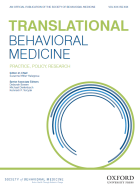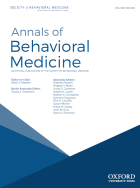
Fall 2021
Editor's Note: We're in This Together
 As the African proverb goes – “it takes a village.” In this SBM village, we are raising our voices through research to empower our village and others. We are creating a village of researchers to be responsive and to act nobly in normal and uncertain times. Our society is a family of sorts and has thrived in a time where others have wavered.
As the African proverb goes – “it takes a village.” In this SBM village, we are raising our voices through research to empower our village and others. We are creating a village of researchers to be responsive and to act nobly in normal and uncertain times. Our society is a family of sorts and has thrived in a time where others have wavered.
Interested in Becoming the Next Editor of Outlook?
Do you have a passion for writing and sharing information? Can you help energize SBM’s membership? Are you looking for a way to get more involved with the society?
Apply by October 29, 2021 to be the next editor of Outlook!
Zooming through a Clinical Training Year: Reflections from a Virtual Clinical Health Psychology Intern

After four years of graduate school, I had a fairly concrete idea in my head of what an internship would look like: challenging but rewarding cases, intensive supervision, bonding with my fellow interns, and growing into a more confident clinician. With the onset of the COVID-19 pandemic, I increasingly grappled with the idea of spending my internship year delivering clinical care from my room in a shared apartment in a new city where I knew almost no one.
New TBM Editor-in-Chief Cheryl L. Knott Hopes to Bridge the Gap from Evidence to Impact
 Incoming Translational Behavioral Medicine Editor-in-Chief Cheryl L. Knott, PhD, FAAHB, has a vision for the journal: Cultivating greater public impact by translating research discoveries into practice. Dr. Knott sees the potential for TBM to be the pinnacle journal filling the niche of both research translation and behavioral medicine.
Incoming Translational Behavioral Medicine Editor-in-Chief Cheryl L. Knott, PhD, FAAHB, has a vision for the journal: Cultivating greater public impact by translating research discoveries into practice. Dr. Knott sees the potential for TBM to be the pinnacle journal filling the niche of both research translation and behavioral medicine.
Paving the Way for Better Cardiovascular Behavioral Medicine: The Need for Implementation Science

The specialty area of “cardiovascular behavioral medicine” has been developed and implemented in a variety of clinical settings to more effectively address the behavioral and lifestyle factors that contribute to cardiovascular disease. The multidisciplinary, patient-centered approach of Implementation Science can aid the scientifically informed integration of behavioral medicine providers into cardiovascular specialty care and rehabilitation and patient engagement.
The Highs and Lows of Scientific Publishing: The Work We Have to Do

In research and science, there is a clear publishing inequity that requires our attention. Female authors and authors of color have seen a decrease in their publications, research projects, and overall scholarly productivity when compared to white male authors during the pandemic, and black authors continue to be significantly less likely to be published, funded, and reviewed as compared to their white counterparts.
Behavioral Interventions for Social Connectedness in Older Family Caregivers: A Call to Behavioral Medicine

With the expected growth of family caregivers driven by population aging, it is important that feasible and principal-driven behavioral interventions are available that can effectively promote caregivers’ social engagement and connectedness, and reduce health risks. The SBM scientific community is poised to substantially advance our understanding of effective intervention targets that can impact social connectedness.
SBM’s Newest Voices of Science Communication



SBM’s Civic and Public Engagement Committee (CPEC) educates members about best practices and techniques for science communication (SciComm). Three members joined CPEC earlier this year, energized and committed to SciComm in behavioral medicine.
Hypnosis: Myths, Misconceptions, and Many Applications for Behavioral Medicine

Hypnosis is an increasingly common mind-body intervention in behavioral medicine settings, with a growing evidence base for disorders such as pain management, smoking, and irritable bowel syndrome (IBS). Unfortunately, there are many myths and misconceptions surrounding hypnosis that may limit patient and provider comfort with this potentially efficacious treatment tool.
Shared Decision Making in the Context of Lung Cancer Screening: Liability or Asset?

Following publication of the landmark National Lung Screening Trial in 2011, nearly every relevant authoritative organization developed practice guidelines in support of low-dose computed tomography for lung cancer screening among eligible individuals. Alongside these recommendations, public policy groups, professional societies, advocacy organizations, and others endorsed informed or shared decision making as the preferred platform for engaging candidates in discussions regarding the option to pursue lung cancer screening.
SBM Award Winner Will Study the Complex Interplay Between Physical Activity and Sexual Violence
 The Society of Behavioral Medicine (SBM) is proud to announce its winner of the 2021 Health and Behavior International Collaborative Award! SBM member Michelle Pebole, MA, is a PhD candidate at the University of Illinois at Urbana-Champaign, and her research is focused on the complex interplay between physical activity and sexual violence.
The Society of Behavioral Medicine (SBM) is proud to announce its winner of the 2021 Health and Behavior International Collaborative Award! SBM member Michelle Pebole, MA, is a PhD candidate at the University of Illinois at Urbana-Champaign, and her research is focused on the complex interplay between physical activity and sexual violence.
Developing a Theory of Health Behavior: An Interview with Howard Leventhal, PhD
 Martin S. Hagger, PhD, co-chair of the Theories and Techniques of Behavior Change Interventions SIG, sat down with Dr. Leventhal to discuss his history of investigating the mechanisms underlying health related actions and examine potential future directions for research relating to the predominant theories in health behavior.
Martin S. Hagger, PhD, co-chair of the Theories and Techniques of Behavior Change Interventions SIG, sat down with Dr. Leventhal to discuss his history of investigating the mechanisms underlying health related actions and examine potential future directions for research relating to the predominant theories in health behavior.
Resources for Researchers Interested in Intervention Optimization

As the science of optimizing interventions continues to grow within behavioral medicine, the Optimization of Behavioral and Biobehavioral Interventions Special Interest Group (OBBI SIG) stands at the ready to connect you to resources! This article provides a list of commonly asked questions and a rundown of resources to help you find the answers you need.
New Articles from Annals of Behavioral Medicine and Translational Behavioral Medicine


SBM's two journals, Annals of Behavioral Medicine and Translational Behavioral Medicine: Practice, Policy, Research (TBM), continuously publish online articles, many of which become available before issues are printed. Click below to read a selection of Annals and TBM articles that were recently made available online.
Honors and Awards
Congratulations to the following SBM members who recently received awards or were otherwise honored. To have your honor or award featured in the next issue of Outlook, please email aschmidt@sbm.org.
Members in the News
The following SBM members and their research were recently featured in journals, news articles, or videos. To have your news spot featured in the next issue of Outlook, please email aschmidt@sbm.org.
Classifieds
Visit the SBM Job Opportunities page for additional positions.
President's Message: You're Not Alone
Like many of you, I recently returned to the classroom after many months of video-mediated interactions. It was uplifting to see students in-person again. The excitement has been palpable, even with masks blocking smiles (theirs and mine). But it’s still different from any fall semester that I remember. Behind the excitement and masks, many of us feel exhausted. If you’re feeling tired and overwhelmed, you are not alone.

